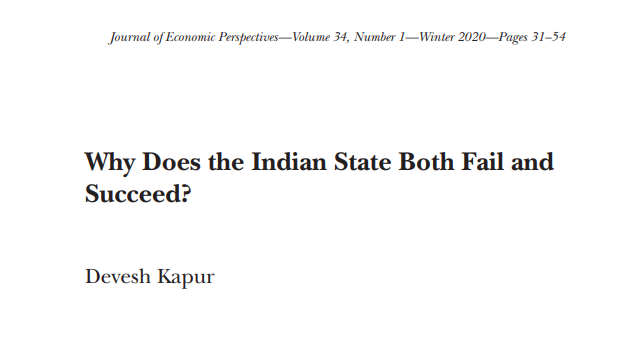Fiscal marksmanship is a problem that plagues the #budgeting process at all level of government, from #Centre to #state governments. Attention is however still focused on the #Centre, despite #states now accounting for one and a half times the spending of the #Centre. (1/n)
This @IDFCinstitute working paper on fiscal marksmanship by @SharmadhaS and @PrakharMisra analyses the revenue #budgets of 28 #states of 15 years to analyse why state #budget estimates often miss the actuals on the various components of their total revenues. (2/n)
Fiscal marksmanship is a structural issue cutting across all #states, whether rich or poor. A rich state like #Kerala overestimated its total revenue in all 15 years but so did #Assam in 14 out of 15 years by an average of a massive 18.18%. (3/n) 

Data also points to the fact that #states do a better job of estimating their own revenues, as opposed to #grants they receive from #Centre under the category of central transfers.The mean overestimation of #grants is twice that of #state own revenues and more volatile. (4/n)
Within #grants, centrally sponsored schemes are especially volatile with #states such as #UttarPradesh and #Sikkim overestimating these schemes in all 15 years. The centralised design of such schemes leads to poor #budget forecasting, affecting on-ground implementation. (5/n)
Poor marksmanship is the result of a complex #budgeting process involving the #FinanceCommission, #Centre and the #states. Projections don't match actuals - because #Centre misprojects revenue or #states their own revenues or #FinanceCommission errs in recommending grants. (6/n)
Besides the above reasons, weak #statecapacity in drawing up #budgets and implementing schemes, conditionalities imposed either by the #Centre or the #FinanceCommission, and exogenous and random shocks such as this #pandemic affect marksmanship. Read the full paper here: (7/n)
@15thFinCom @RBI @karnikajit @AmartyaLahiri @MGovindaRao12 @arvindsubraman @AshokKLahiri
@petheabhay @ajay_shah @avani_kapur @bhargavizaveri @IlaPatnaik
@petheabhay @ajay_shah @avani_kapur @bhargavizaveri @IlaPatnaik
@lekhachakrborty @mihirssharma @MilanV
@pinakichakrbrty @pritika13 @EmergingRoy @Roshanjnu @RahulBajoria_ @nebuer42 @ASanthoshMathew @srajagopalan @AiyarYamini @sush_hede
@pinakichakrbrty @pritika13 @EmergingRoy @Roshanjnu @RahulBajoria_ @nebuer42 @ASanthoshMathew @srajagopalan @AiyarYamini @sush_hede
• • •
Missing some Tweet in this thread? You can try to
force a refresh








